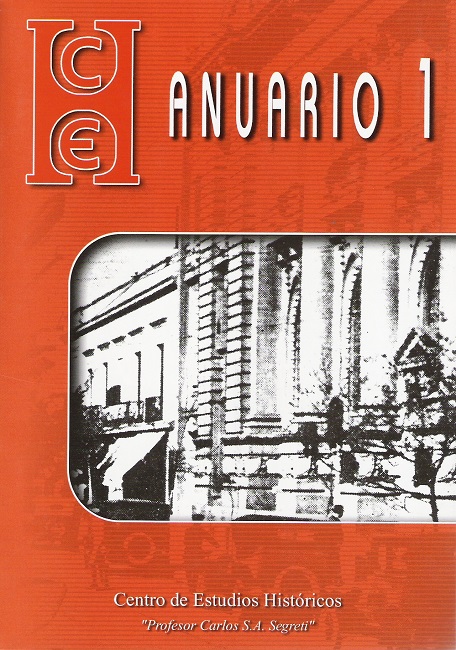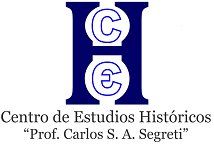Organizing souls... Until We Are All Peronists - Analysis of Perón's Discourse on Politics between 1944 and 1955-
DOI:
https://doi.org/10.52885/2683-9164.v.n1.23318Abstract
In this paper, the author tries to clarify the meaning of politics in the peronist ideology, specially analyzing the speeches of his leader, Juan Domingo Perón, between 1944 and 1955, considering that this is one of the subjects less analyzed in the works about peronism and that the concept of politics is essential to understand the others excerpts of the ideology. The repudiation of the politics of the past, the politics ofthe oligarchy and the political parties connected with it, allows Perón to recognize a physical politics -the politics of conflict and division-, and he rebuilds this kind ofpolitics from the peronist movement point of view, understood as a new struggle between peronist andanti-peronist, patriots and anti-patriots. Perón detests anarchy and that's why he hates diversity and refuses pluralism; identifying peronism with Nation, he tries to put into the citizens' consciousness the idea of the people unity. The establishment of the doctrinaire unity is his next step, transferring the doctrine from the Peronist Movement to the all Nation: with the help of the Five Year Second Plan, the peronism became the national doctrine which was imposed as the argentine essence to the whole body of citizens. Assimilating peronism and Patria (homeland), Perón converts the peronist doctrine in the womb that gives rise twin souls, peronist souls. Concluding his project, Perón appeals to a technical concept of politics -politics as organization of the Nation and the citizens' souls-, guided by the special virtues of the leader; organization by the means of the State, conceived as an efficient machine that only had compassion for the poor. In the conclusion the author suggests the importance of studying peronism as an ideology that supports a politics of homogeneous consciousness, a civic or political religion.
Downloads
References
BOSCA Roberto, La Iglesia nacional peronista, Buenos Aires, 1977.
CAIMARI Lila M., Perón y la Iglesia Católica, Buenos Aires, 1995.
CIRIA Alberto, Política y cultura popular: la Argentina peronista. 1946-1955, Buenos Aires, de la Flor, 1983.
DE IPOLA Emilio, “El hecho peronista”, en: ALTAMIRANO Carlos (ed.), La Argenina en el siglo XX, Buenos Aires, 1999.
ARENDT Hanna, Between past and future, New York, 1977.
BUCHRUCKER Cristian, Nacionalismo y peronismo. La Argentina en la crisis ideológica mundial (1927-1955), Buenos Aires, 1987.
ELOY MARTÍNEZ Tomás, Las memorias del General, Buenos Aires, 1996.
HERNÁNDEZ ARREGUI Juan José, Nacionalismo y liberación, Buenos Aires, 1969.
ITURRIETA Aníbal (ed.), El pensamiento peronista, Madrid, 1990.
JAMES Daniel, Resistencia e integración, Buenos Aires, 1990.
LUNA Félix, Perón y su tiempo, t.I, Buenos Aires, 1987.
FERNÁNDEZ PARDO C.A, LÓPEZ RITA A., Socialismo nacional, Buenos Aires, 1973.
PEÑA Milcíades, Peronismo. Selección de documentos para la histria, Buenos Aires, 1973.
PLOTKIN Mariano, Mañana en San Perón, Buenos Aires, 1993.
ROZITCHNER León, Perón: entre la sangre y el tiempo, Buenos Aires, 1985.
SAMPAY Arturo Enrique, La Argentina en la Revolución de nuevo tiempo, Buenos Aires, 1964.
SCHMITT Carl, El concepto de lo político, México, 1985.
SIGAL Silvia y VERÓN Eliseo, Perón o muerte, Buenos Aires, 1988.
Downloads
Issue
Section
License
Aquellos autores/as que tengan publicaciones con esta revista, aceptan los términos siguientes:
- Los autores/as conservarán sus derechos de autor y garantizarán a la revista el derecho de primera publicación de su obra, el cuál estará simultáneamente sujeto a una Licencia de reconocimiento de Creative Commons. Se puede compartir, copiar, distribuir, ejecutar y comunicar públicamente la obra, siempre que: a) se cite la autoría y la fuente original de su publicación (revista, editorial y URL de la obra); b) no se use para fines comerciales; c) no se altere, transforme o genere una obra derivada a partir de esta obra.
- Los autores/as podrán adoptar otros acuerdos de licencia no exclusiva de distribución de la versión de la obra publicada (p. ej.: depositarla en un archivo telemático institucional o publicarla en un volumen monográfico) siempre que se indique la publicación inicial en esta revista.
- Se permite y recomienda a los autores/as difundir su obra a través de Internet (p. ej.: en archivos telemáticos institucionales o en su página web) después del proceso de publicación, lo cual puede producir intercambios interesantes y aumentar las citas de la obra publicada. (Véase El efecto del acceso abierto).









